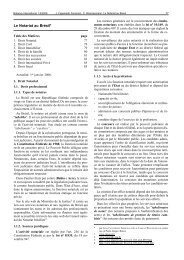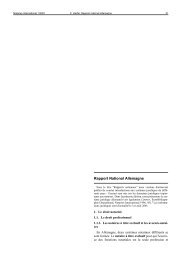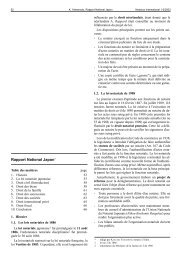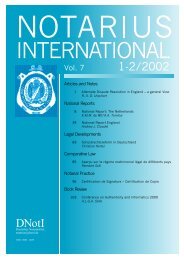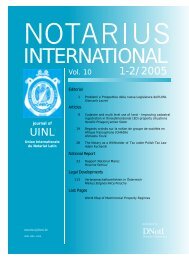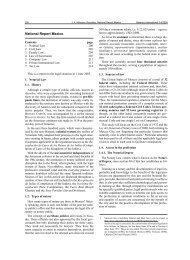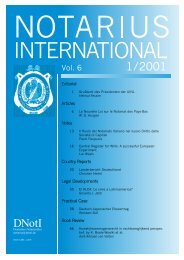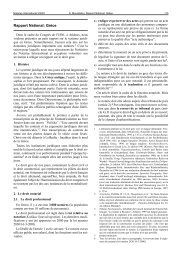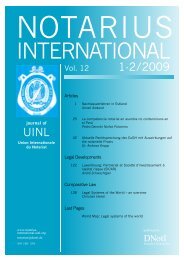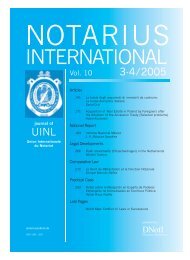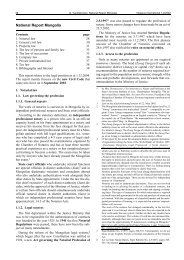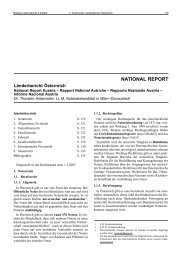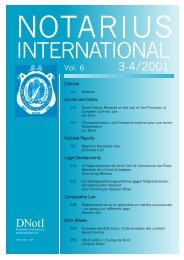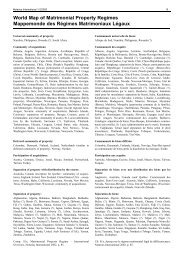ARTICLES and NOTES - Notarius International
ARTICLES and NOTES - Notarius International
ARTICLES and NOTES - Notarius International
You also want an ePaper? Increase the reach of your titles
YUMPU automatically turns print PDFs into web optimized ePapers that Google loves.
226 C. Hertel, Preventive Consumer Protection <strong>Notarius</strong> <strong>International</strong> 3-4/2002<br />
sion of a contract. Without the formal requirement,<br />
the parties might conclude the contract even if it is invalid;<br />
so third parties (or the parties of the contract<br />
themselves) might be mistaken to think there were a<br />
valid contract.<br />
4.3.2. Notarial Form <strong>and</strong> Right to Withdraw cannot<br />
be combined<br />
Formal requirements can replace the right to withdrawal<br />
as an alternate method of consumer protection.<br />
The imbalance between the consumer <strong>and</strong> the entrepreneur<br />
might be corrected by information duties 35 <strong>and</strong><br />
by giving the consumer a right to withdrawal (a cooling<br />
off period). However, the same goal is achieved by the<br />
impartial legal counseling given during the notarial act:<br />
- The notary has to warn the weaker party if the proposed<br />
contract poses particular dangers for the weaker<br />
party. That is even better than an information given<br />
by the entrepreneur.<br />
- The notarial act in itself <strong>and</strong> the notarial counselling<br />
warns the weaker party not to conclude a contract<br />
without first considering the consequences. This is<br />
equivalent to a cooling off period afterwards. Therefore,<br />
it does not make sense to grant a right to withdrawal<br />
even if the contract is concluded by a notarial<br />
act. The right to withdrawal might even impede an effective<br />
counseling by the notary, because the consumer<br />
might not listen carefully, because he thinks, that he<br />
can withdraw anyway if does not like the contract –<br />
<strong>and</strong> thus he might miss some important information or<br />
miss the chance to change <strong>and</strong> improve the contract<br />
before it has been concluded.<br />
Therefore, notarial acts should be exempted from<br />
the right to withdrawal. This has already been regulated<br />
in some directives or national legislation:<br />
- E.g. the new directive on the distance marketing of<br />
consumer financial services, article 6 section 3 c),<br />
grants members states the choice to exclude the right<br />
to withdrawal for “declarations by consumers using<br />
the services of an official”.<br />
- In German law, which gives the consumer a right to<br />
withdraw from a consumer credit (as it is planned also<br />
in the proposed reform of the EC-directive), the<br />
right to withdrawal does not apply for credit contracts<br />
that are in a notarial act (art. 491 sec. 1, 495 BGB).<br />
Similarly, the right of withdrawal for doorstep contracts<br />
is excluded if the contract has been concluded<br />
in a notarial act (because the notarial act interrupts the<br />
influence of the doorstep situation) (art. 312 BGB).<br />
My argument is, that this should be a general principle<br />
in European law to be included into the common<br />
frame of reference as well as into the optional instrument.<br />
4.3.3. Drawbacks of the existing Consumer Protection<br />
Finally, in my view the notarial act <strong>and</strong> the notarial<br />
counselling can be more flexibly adapted to the individual<br />
party’s need for protection <strong>and</strong> thus provide an even<br />
better protection than the right to withdrawal.<br />
The concept of “consumer” in the existing directives<br />
sometimes has been critized as too formal 36 . There are<br />
quite a few cases where the consumer does not need<br />
protection, but where the consumer might be on an equal<br />
footing with the entrepreneur.<br />
Here, my “favourite” case is BGHZ 149, 80 37 : Some<br />
lawyers <strong>and</strong> business consultants had asked for a credit<br />
for an investment of several million Deutschmark. Since<br />
they were private investors, they qualified as consumers<br />
under the rules for consumer credit – although they were<br />
quite experienced in legal <strong>and</strong> financial questions. The<br />
credit contract did not contain all the information about<br />
the interest rate required by the rules on consume-credit.<br />
Therefore, the BGH decided that these highly qualified<br />
professionals would have to pay only the lower statutory<br />
interest rate (of 4% instead of the contractual rate agreed<br />
upon of about 8%). For me, this is an example of unneccessary,<br />
because overly formalized consumer protection.<br />
In other cases, it might not only be the consumer who<br />
needs protection, but the protection might be more adequately<br />
fixed for a certain type of contract 38 .<br />
Also the notarial counseling can be more flexibly<br />
adapted to the individual party’s need for protection; the<br />
counselling might lead to a contract tailored to the<br />
special needs of the parties, whereas the right to withdrawal<br />
just gives the choice of Yes or No. The right of<br />
withdrawal works better in st<strong>and</strong>ard contracts, whereas a<br />
notarial act seems better fit for a complicated deal which<br />
requires an individually tailored contract.<br />
There is always a certain tension between the right to<br />
withdrawal <strong>and</strong> the principle of contractual freedom 39 ,<br />
whereas the legal counseling in an notarial act might even<br />
help the parties to fully implement their contractual freedom<br />
<strong>and</strong> get the contract they actually want.<br />
Thus, I hope I have made my case, that a notarial act is<br />
one possible way of protecting the weaker party. Therefore<br />
it can <strong>and</strong> should replace other forms of consumer<br />
protection, in particular the consumer’s right to withdrawal.<br />
35 comp. e.g. Fleischer, Informationsassymetrie im Vertragsrecht, 2000;<br />
Fleischer, ZEuP 2001, 772; S. Grundmann, Privatautonomie im Binnenmarkt<br />
– Informationsregeln als Instrument, JZ 2000, 1133.<br />
36 For a critical analysis of the term consumer in existing directives <strong>and</strong><br />
its implications, comp. Brambring, Wer schützt den Verbraucher vor<br />
dem Verbraucherschutz, ZNotP 203, 42; Canaris, AcP 200 (2000)<br />
273, 362; Th. Pfeiffer, Der Verbraucherbegriff als zentrales Merkmal<br />
im europäischen Privatrecht, in: H. Schulte-Nölke/Reiner Schulze<br />
(ed.), Europäische Rechtsangleichung und nationale Privatrechte<br />
(note 17), p. 21-43.<br />
37 BGH, 23 october 2001 – XI ZR 63/01, BGHZ 149, 80 = DNotZ 2002,<br />
528 = NJW 2002, 368.<br />
38 O. Remien, Verbraucherrecht oder allgemeines Privatrecht für die Europäische<br />
Union in: H. Schulte-Nölke/Reiner Schulze (ed.), Europäische<br />
Rechtsangleichung und nationale Privatrechte (note 14), p.,<br />
107, 113 s.<br />
39 comp. Canaris, AcP 200 (2000) 273, 361; B. Dauner-Lieb, Verbraucherschutz<br />
durch Ausbildung eines Sonderprivatrechts für Verbraucher,<br />
1983, p. 119; Gernhuber, WM 1998, 1797.



